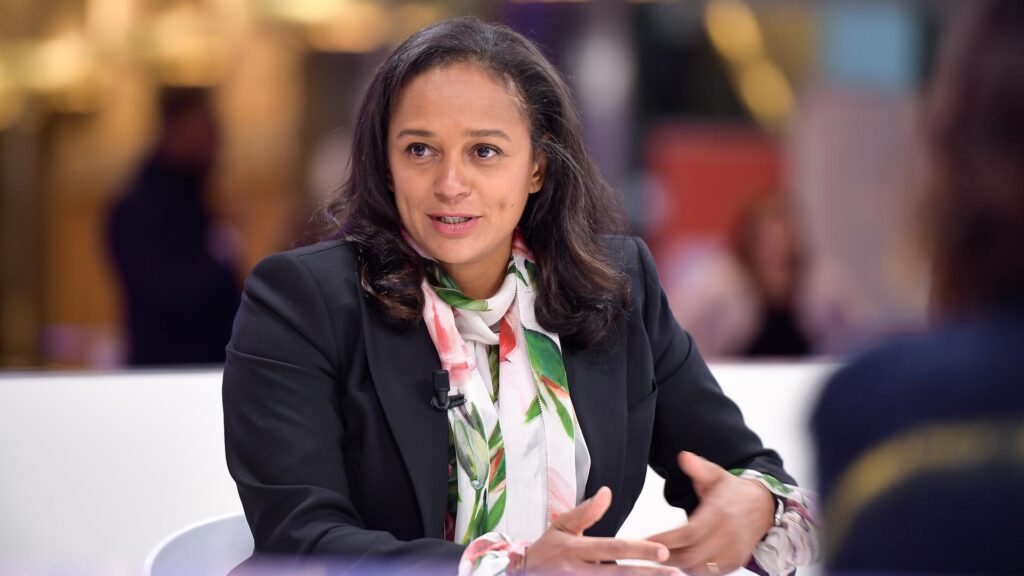Dos Santos, the daughter of Angola’s former authoritarian president José Eduardo dos Santos, was the subject of the International Consortium of Investigative Journalists’ 2020 Luanda Leaks investigation.
Luanda Leaks reporting showed how insider deals, political connections and an army of Western enablers helped dos Santos amass a fortune.
The exposé revealed how the billionaire and her allies benefited from lucrative deals in oil, diamonds, telecommunications, banking and real estate.
According to Portugal’s press Lusa news agency, Interpol issued the warrant following a request from Angolan prosecutors.
Polícia Judiciária sources in Lisbon said the Interpol warrant alleges dos Santos created corrupt financial mechanisms between 2015 and 2017.
The mechanisms, it alleges, were created “with the intention of obtaining illicit financial gains and whitewashing suspicious criminal operations.”
The sources said the warrant further alleges that dos Santos acted upon information she had obtained as then-head of Angola’s state oil company, Sonangol.
Lusa said dos Santos, 49, was wanted for alleged embezzlement, fraud, influence peddling and money laundering.
Interpol declined to comment when asked to confirm that it had made an international request for dos Santos’s arrest on receipt of a “Red Notice” from Angola, saying it did not comment on specific cases except in special circumstances.
Interpol said a “Red Notice” request was a call to law enforcement worldwide “to locate and provisionally arrest a person pending extradition, surrender, or similar legal action.”
Dos Santos has previously denied benefiting unfairly from her father’s position as Angolan president or any other wrongdoing.
The Luanda Leaks investigation, which had a profound impact on Africa’s then richest woman and her family, uncovered dos Santos’ dealings in a network of companies, including Sonangol.
Angolan and Portuguese authorities froze dos Santos’ assets and bank accounts and launched criminal investigations. The business empire was largely dismantled.
Last year, ICIJ’s Pandora Papers investigation tied dos Santos and other powerful Angolan figures accused of embezzling billions of dollars to financial hideaways.
Subsequently, the United States froze dos Santos’s assets and bank accounts and launched criminal investigations into her business.
Dos Santos has homes in Dubai and London and is believed to visit Portugal often.
Her father, José Eduardo dos Santos, an autocrat who ruled over Angola for decades, died in Barcelona last year following a long illness.
Her husband, Sindika Dokolo, died the previous year in a free diving accident off an island near Dubai.
An international tribunal in the Netherlands ruled after his death that he and his wife had obtained a stake in the Portuguese oil company Galp in a way that was “tainted by illegality.”
The tribunal ordered dos Santos to return the $500 million stake which was secured in a controversial deal through Sonangol when her father was still president.
ICIJ revealed that dos Santos and Dokolo had obtained the Galp stake for just a $15 million initial deposit, in the deal overseen at the time by dos Santos’ father.
The Luanda Leaks investigation was based on a trove of 715,000 documents including emails, charts, contracts, audits, and accounts that help explain how dos Santos built a business empire worth an estimated $2 billion.
httpv://www.youtube.com/watch?v=0MyrbVoJgnY
The Platform to Protect Whistleblowers in Africa, an organization based in Paris, France, obtained the files and shared them with ICIJ.
In a statement sent to Reuters today, dos Santos’ representatives said she had not been made aware of the arrest warrant.
Dos Santos’ business dealings also featured in ICIJ’s FinCEN Files investigation.
________________________________________________
This story has been updated since original publication with comment from Interpol.
- Web of corruption around Isabel dos Santos still being untangled two years after Luanda Leaks – Jan 24, 2022
- US sanctions Angolan billionaire Isabel dos Santos for corruption – Dec 09, 2021
- German state-owned bank fined for Angolan loan exposed in Luanda Leaks – Sep 03, 2021
- Isabel dos Santos ordered to return to Angola $500 million in shares ‘tainted by illegality’ – Aug 02, 2021
![]() The International Consortium of Investigative Journalists is a global network of more than 190 investigative journalists in more than 65 countries who collaborate on in-depth investigative stories. Founded in 1997 by the respected American journalist Chuck Lewis, ICIJ was launched as a project of the Center for Public Integrity to extend the Center’s style of watchdog journalism, focusing on issues that do not stop at national frontiers: cross-border crime, corruption, and the accountability of power. Backed by the Center and its computer-assisted reporting specialists, public records experts, fact-checkers and lawyers, ICIJ reporters and editors provide real-time resources and state-of-the-art tools and techniques to journalists around the world. More…
The International Consortium of Investigative Journalists is a global network of more than 190 investigative journalists in more than 65 countries who collaborate on in-depth investigative stories. Founded in 1997 by the respected American journalist Chuck Lewis, ICIJ was launched as a project of the Center for Public Integrity to extend the Center’s style of watchdog journalism, focusing on issues that do not stop at national frontiers: cross-border crime, corruption, and the accountability of power. Backed by the Center and its computer-assisted reporting specialists, public records experts, fact-checkers and lawyers, ICIJ reporters and editors provide real-time resources and state-of-the-art tools and techniques to journalists around the world. More…
